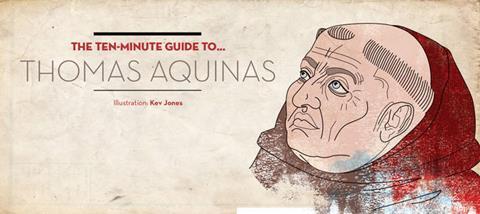
Aquinas was born between 1224 and 1226, at his family castle of Roccasecca, between Rome and Naples. The castle is the giveaway: Aquinas came from noble stock. He was, however, the youngest son, so he was dealt with in the traditional manner. Aged five he was handed over to be educated at the nearby Benedictine abbey of Monte Cassino, where he soon became known for his repeated question: ‘What is God?’
After a few years, his family transferred him to the new University of Naples, and it was there that he came across the Order of Preachers (‘Dominicans’). This was a studious order of friars who lived by begging. Impressed, Thomas soon joined them and entered the Dominican life of academic study and teaching.
His family was horrified. They had hoped for some high and respectable Church office for their son, not that he would be on the streets begging with some upstart bunch of radicals. So, when he went travelling north past the family estates, they kidnapped him and imprisoned him for a year or more while they attempted to dissuade him from his chosen career. Dissuasion meant tactics such as slipping a scantily clad beauty into his cell to seduce him. Resilience for Aquinas meant fending her off with a burning stick (with which he could also make encouraging signs of the cross). Unable to be torn by from his study of Aristotle’s logic and the Bible by such distractions, he was eventually released.
BELLOWS OF THE OX
Aquinas headed north to Paris and then Cologne, where he studied under the great scholar of Aristotle’s work, Albert (who was known even in his own lifetime as ‘the Great’).
Before Albert, nobody really seemed to have noticed Aquinas’ intellectual potential. He was physically large, tall and portly, and since such heavy features were combined with a distinct lack of personal sparkle, many assumed he was rather backward and nicknamed him the ‘Dumb Ox’. But Albert saw otherwise: ‘We call him the Dumb Ox’, he said, ‘but the bellowing of that ox will resound throughout the whole world.’
Still today, the combination of sharp mind and slow manner make Aquinas hard to sum up. On the one hand, the hagiography has turned the mild-mannered friar into a veritable Buddha of serenity. On the other, his own theological and philosophical output reveals a ferocious intellectual energy. Then there are the anecdotes. In his prime, Aquinas would, apparently dictate to three or four secretaries simultaneously, and would even keep dictating lucidly after he had fallen asleep. There are other stories of his phenomenal ability to concentrate. All told, they seem to suggest a quite remarkable intellect, although it is very hard to know what to believe, since Aquinas’ stature as a theologian has steeped his life in legend such that all sorts of miracles and mystical experiences are attributed to him, from levitating to conversing with crucifixes.
THE PARIS YEARS
Having picked up on Aquinas’ potential, Albert arranged for him to return to Paris and study to become a ‘master’ (a title soon replaced by ‘doctor’) in theology. Aquinas was technically too young to be eligible, but nevertheless spent his formative teaching years in Paris, lecturing on Peter Lombard’s Sentences (then the standard textbook of theology), writing treatises and commentaries, and even starting to write one of his major works, Summa contra Gentiles.
After a few years in France, Aquinas headed back to the warmer climes of his native Italy, and there he spent the next decade, half with the papal court, where he became the close friend of two popes, and half in Dominican study houses. It was in one of these houses that he had set up in Rome that he began to write his main work, the Summa Theologiae (‘Summary of Theology’). From then on, wherever he was (including a stint back in Paris), it was this that dominated, even though he still produced a heavy stream of other works.
He had almost finished the work and had just finished writing on the Eucharist when, on Wednesday, 6th December, 1273, while attending Mass in Naples, Aquinas underwent a profound experience. It so affected him that he never wrote another word, explaining: ‘I cannot, because all that I have written seems like straw to me.’
Titles given to Aquinas
Universal Doctor of the Church
A model of the right way to do theology
Defender of the Catholic Church and conqueror of heretics
The Angelic Doctor
The next February, he was travelling to the Council of Lyon, which was an attempt to reunite the Western and Eastern churches, when he hit his head on a tree branch and had to be taken to the nearby monastery of Fossanova to recover. But he never did. There, a few short miles from his birthplace, and still in his 40s, he died on 7th March, 1274.
INSIDE A GREAT MAN’S HEAD
Aquinas seems to have spurted ink like a cuttlefish, producing in his short life a staggering mountain of books. His works need a holistic approach; he was possibly the most untweetable theologian ever. Many would find quotes from his writing quite impenetrable and off-putting.
The definitive edition of his works began to be assembled in 1882 and remains unfinished. His crowning achievement, however, was his Summa Theologiae. In it, Aquinas managed to cover all the usual bases as well as some more unusual ones, such as: Is there rivalry between guardian angels as to who has the best charge? Are demons influenced by the planets as humans are? Is the soul in each part of the body? Is semen produced by eating too much? Should prayer be vocal? Should Christ have been born in winter? Into which hell did Christ descend, and did he take his body with him? Will we be resurrected with our hair and nails? And will we all be male? Or transparent?
HOW DO YOU SOLVE A PROBLEM LIKE ARISTOTLE?
One of the thorniest issues of the day was what to make of the ancient Greek philosopher Aristotle, whose works were then becoming ever more available and popular. Aristotle had soon divided the academic world. Some seemed to swallow him whole; others saw worrying issues, such as his view that the world had always existed. Aquinas proposed a system in which he sought to bring pagan Aristotelianism into Christianity in a way that preserved the integrity of both. It would be a Christian Aristotelianism.
Aristotle, he suggested, can generally be relied upon in what he said. However, Aristotle knew only the natural order of things; only lacking divine revelation, he was ignorant of the supernatural order, which theology must investigate. Nevertheless, Aquinas argued, Aristotle was able to provide reliable philosophical foundations upon which theology could build. Moreover, despite Aristotle’s own ignorance of the supernatural, Aquinas believed his logic was so reliable that it could be extended to analyse the supernatural realm he had never known.
This model would not simply inform Aquinas’ view of how we know things; it lay at the heart of his very notion of reality. There are two realms, he believed: the natural and the supernatural, but the two never conflicted. Rather, the supernatural (including faith) always built upon and perfected the natural (including reason).
That meant some significant things. First, he argued, our natural reason can tell us a good deal that’s true about God. By reason alone (without the Bible) we can know, for example, that God is perfect, good, desirable, infinite, unchanging and timeless. It’s only when we come to concepts such as the Trinity, he believed, that we really need God to speak and tell us about himself.
This also led Aquinas to believe that our human problem is not so much that we are sick and need healing; it is that we don’t do well enough. God’s grace simply improves what we already are. Practically, that means that if we do not make ourselves better, even God’s grace will not help us.
His was a theology for the wise and strong, not the struggling.
The 5 Ways
One of Aquinas’ best-known achievements is his argument that the existence of God can be proved in five ways:
1 The first way is based on the fact that we see movement and change happening in the world. Everything that moves or changes must be moved or changed by something. And, like a series of dominoes, there cannot be an endless chain of movers, otherwise there would be no first mover and thus no motion or change at all. There must, therefore, be a first unmoved mover, ‘and this everyone understands to be God’.
2 Similarly, the second way argues that there must be a first uncaused cause.
3 The third way argues that nothing can come from nothing. For the universe to exist, there must be a necessary being before it all: God.
4 The fourth way argues that we see ‘more’ and ‘less’ all around; there must, therefore, be something that is most hot, something that is most high, something that is ‘uttermost being’, ‘and this we call God’.
5 The fifth way is effectively an argument from design; that we see even inanimate things working in ways that seem designed, and in ways that suggest a designer.
Michael Reeves is director of Union Theology (uniontheology.org) and author of Introducing Major Theologians (IVP)


























